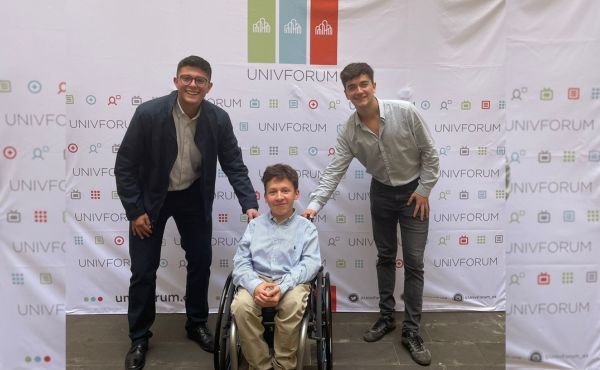Vicente, an engineering student, is one of the driving forces behind “Manos que Cuidan”, a social project born in response to a frequently invisible reality: the need to support caregivers for people with disabilities and/or the elderly in Chile.
While most social initiatives focus on those living with illness or dependency, few take the time to consider those who are there for them, day in and day out: the caregivers.

69% of caregivers suffer from severe physical and emotional overload, and 87% provide care 24 hours a day, 7 days a week, with no rest
Vicente, how did the project begin?
The idea took shape in August 2024, when we decided to participate in the UNIV University Congress in Chile, a platform where university students present proposals for social impact. The theme for the 2025 congress was “Citizens of the World,” so we wanted to contribute with a human and social approach, but we weren’t yet sure which issue to address.
After several meetings with the Teletón Foundation, we began a deep investigation that led us to alarming statistics: 69% of caregivers suffer from severe physical and emotional overload, and 87% provide care 24 hours a day, 7 days a week, with no rest. That was the turning point. We decided to focus all our efforts on caring for those who care.
After interviews with professionals and experts, we defined our initiative’s objective: to provide comprehensive support and continuous accompaniment to caregivers of people in dependent situations. With this goal in mind, we presented our project at UNIV Chile, where it was chosen as the national winner, giving us the opportunity to represent it at the International UNIV FORUM Congress in Rome, Italy, on 15 April 2025.

How did you implement it?
After this first step, we faced the challenge of implementing a pilot plan that would allow us to present tangible results in April. We reached out to Fundación Las Rosas, who enthusiastically welcomed our proposal and committed their support. They connected us with Egnis Ubillo, Head of Health and Psychosocial Services at the foundation, who became a key ally in structuring and executing the plan.
Since our financial resources were limited, we also sought help from the
Alborada University Residence, where we live, and joined their summer service trips in the community of Cajón (Temuco), organized through another social initiative called Operativos Llaima. Thanks to them, we had food, transport, volunteers, and lodging.
Our on-the-ground experience began on 3 January 2025. We carried out home visits coordinated in advance with the local CESFAM (Family Health Centers) in Cajón, to gain a deeper understanding of the lives of local caregivers. This experience led us to expand into the municipality of Vilcún, one of the most vulnerable areas in the country, where we formed a strategic partnership with the group “Abrazo Solidario,” another key player in our project’s implementation.
During the pilot phase, we touched over 20 families, including both caregivers and those they care for. From this experience, and with ongoing support from Fundación Las Rosas, we designed a new phase of the project: three clinical and psychoeducational operations held in March, April, and May, benefitting 30 families with members in situations of severe dependency.
Each operation included an interdisciplinary team made up of professionals in nursing, physical therapy, occupational therapy, and others, overseen by a general coordinator. In April, Dr. Alejandro Ceriani, an internist and geriatrician, joined the effort to provide specialized care for people over 60 years old.

After gaining on-the-ground experience, you presented it in Rome. How did that go?
Armed with this support and evidence, we presented “Manos que Cuidan” at the International UNIV FORUM Congress in Rome, where our project was recognized for its sustainability, innovation, and depth. We were ultimately honored as international winners of the congress, which reaffirmed the urgency and importance of supporting caregivers within our social systems.
We are currently in a planning phase to ensure the long-term sustainability of this initiative, strengthening partnerships with Fundación Las Rosas and the Abrazo Solidario group in Vilcún, and evaluating new areas for intervention.
Could you tell us about the project in greater detail?
The “Manos que Cuidan” project has two main phases. The first is diagnosis and human accompaniment. In this phase, a group of volunteers visits rural areas to learn about the caregivers’ realities, offer human connection, listen to their needs and life stories, and provide space for personal and spiritual dialogue.
The second phase involves professional intervention. Monthly operations are coordinated by Fundación Las Rosas, with a team of specialists visiting the identified families. These visits provide clinical care, psychoeducation, and training in caregiving techniques, improving the well-being of both caregivers and their loved ones.

The Prelate of Opus Dei, Msgr. Fernando Ocáriz, met with young people attending the UNIV 2025 Congress
The theme of the gathering (“Citizens of Our World”) was an opportunity for Monsignor Ocáriz to encourage the young people to “pray a lot for the many people who are suffering around the world in wars, earthquakes, tragedies that are reported in the media, and many others that are not.” He reminded them, with St. Paul, that “the whole world is ours. It truly belongs to us, and we can help in everything. When you hear news about a war, say a prayer. It’s incredibly valuable.”
